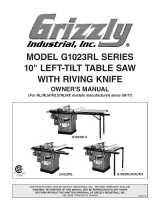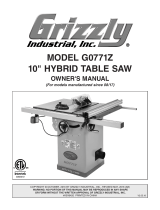
2
GENERAL SAFETY WARNINGS
BP0222
This product is designed only for specific applications as defined in the instructions and should not be modified or used for any
manner not described in these instructions. Use only recommended accessories. Before using the Router Table Box Joint Jig:
READ, UNDERSTAND and FOLLOW ALL INSTRUCTIONS AND SAFETY WARNINGS. KEEP THESE INSTRUCTIONS
READILY AVAILABLE FOR FUTURE REFERENCE.
> Always confirm that you are using the most recent version of
the Instructions and safety warnings for your product (see the
Instructions link on the product page at Rockler.com).
> Before using another tool with this product, always read,
understand and follow the instructions and safety warnings
in the owner’s manual for that tool. If you do not have the
owner’s manual, obtain one from the tool’s manufacturer
before using it with this product.
> Before using any chemical with this product, always read,
understand and follow all safety warnings and guidelines in
the manufacturer’s Safety Data Sheet (SDS; formerly called
“MSDS”), especially regarding:
• How to safely use the chemical, including potential hazards
and recommended first aid measures;
• Personal safety equipment required to safely use the
chemical (e.g. gloves, eye protection, mask/respirator, etc.);
• Proper and safe handling, storage and disposal of
the chemical.
> Before using this product, review and verify that all tools to be
used with it have safety equipment installed and are in proper
working order as defined by the tool’s owner’s manual.
> Do not use this product until you have read and are
confident you understand:
• Product Specific Safety Warnings (p. 3);
• Parts List (p. 4);
• Setup (pp. 5-7);
• Use (pp. 7-8).
> The user assumes all risk and responsibility for the proper and
safe use of this product and for ensuring product suitability for
the intended application.
> It is the sole responsibility of the purchaser of this product
to ensure that anyone you allow to use this product reads
and complies with all instructions and safety precautions
outlined in this manual prior to use.
> Follow all standard shop safety practices, including:
• Keep children and bystanders away from the tool
operating area;
• Do NOT use power tools in explosive environments, or in
the presence of flammable liquids, fumes or dust;
• TURN OFF AND UNPLUG all power tools BEFORE
making any adjustments or changing accessories;
• Remain alert and use good judgment. Do not use this
product if you are in any way impaired by medications,
alcohol, drugs or fatigue;
• Keep your work area well lit and clean;
• Dress appropriately. Secure loose clothing, remove all
jewelry and tie up long hair before using this product;
• ALWAYS wear safety glasses, hearing protection
and respiratory protection that complies with
NIOSH/OSHA/ANSI safety standards;
• Use dust collection tools and dust face masks to
reduce exposure to dust;
• Use safety equipment such as featherboards, push
sticks and push blocks, etc., when appropriate;
• Maintain proper footing at all times and do not overreach;
• Do NOT force woodworking tools.
> These warnings and instructions do NOT represent the total
of all information available regarding tool safety, use and
technique. Always seek out opportunities to learn more
and improve your skills and knowledge.
Drilling, sawing, sanding or machining wood
products can expose you to wood dust, a substance known
to the State of California to cause cancer. Avoid inhaling
wood dust or use a dust mask or other safeguards for
personal protection. For more information go to
www.P65Warnings.ca.gov/wood.
Danger indicates a hazardous situation that, if not avoided, will result in death or serious injury.
Warning indicates a hazardous situation that, if not avoided, could result in death or serious injury.
Caution indicates a hazardous situation that, if not avoided, may result in minor or moderate injury
or property damage.
Notice indicates important or helpful information and/or user tips.









